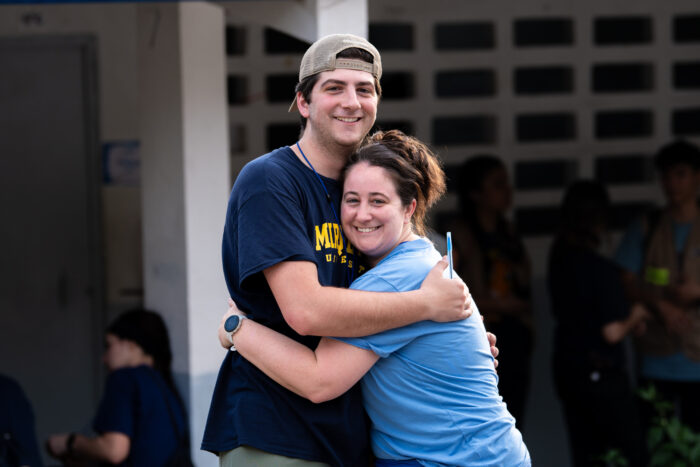Marquette Nursing is a regional leader in person-centered research, including issues related to caregiving. During National Caregivers Month, which runs for the duration of November each year, this mission is more important than ever. Three professors in the college who specialize in caregiving research took the time to reflect on why the well-being of caregivers is important to society.
These three researchers are:
- Dr. Abiola Keller, associate professor and interim associate dean for research
- Dr. Kim Whitmore, assistant professor
- Dr. Norah Johnson, director of the Pediatric Primary Care Nurse Practitioner Program
Why are caregivers important?
NORAH: Caregivers ( e.g. parents, spouses, adult children, siblings) are important because they help meet the many needs of persons of all ages who are not able to care for themselves. Persons who need care are often those with intellectual/cognitive, physical, developmental disabilities and/or mental illness.
KIM: According to a 2023 report from the AARP, family caregivers in the United States provide an estimated $600 billion in unpaid services each year. Without the unpaid work of family caregivers, our health care system would collapse.
ABIOLA: Caregiving is an important issue because it touches almost everyone in some way. In the words of Rosalynn Carter: “There are only four kinds of people in the world. Those who have been caregivers. Those who are currently caregivers. Those who will be caregivers, and those who will need a caregiver.”
How can we better support caregivers?
NORAH: We can directly support caregivers by helping them have healthy coping strategies and by providing resources and encouragement. More broadly, policies that support caregivers are those that provide time, financial resources ( e.g. managed care insurance, supplemental income, and nutrition assistance) and services to meet the physical and mental health needs of caregivers to counteract stress. A couple great resources in Wisconsin counties include the Aging and Disability Resource Centers and the YMCA.
KIM: Nurses need to help identify caregivers, assess their needs, and connect them to supportive resources, like respite. Respite is commonly referred to as a “break” from caregiving. By providing temporary relief from the responsibilities of caregiving, respite can have many benefits to the caregiver, including reduced stress, reduced fatigue, and improved quality of life. Respite is one of the most frequently requested support services. However, respite needs are often unmet.
ABIOLA: We need to talk about the caregiving roles as part of who people are. One of the challenging things for caregivers who are in the paid workforce is that their employer is often unaware of family caregiving responsibilities they have. Sometimes, employees may be reluctant to disclose their caregiving status because they are concerned about assumptions that may be made about them and their work habits.
What are the questions around caregiving that you explore in your research or are interested in exploring?
NORAH: My past research involved the experience of family caregiving for individuals with autism spectrum disorder and its impact on the health of parent. I’ve been part of interdisciplinary research on the impact of caregiving stress on parent health, and the benefit of stress reducing interventions, including swimming and group exercise. My current research interest is in transition of adults with intellectual disabilities into long term care settings that promote the highest quality of life. (Read more here.)
KIM: My research focuses on understanding and addressing the respite needs of family caregivers across the lifespan. I work in partnership with local, state, national, and international organizations to ensure all caregivers get the break they need. (Read more here.)
ABIOLA: My research focuses on protecting and promoting the health of women, particularly African American women. Caregiving is a women’s health issue. Generally, women are more likely to be caregivers than men and African American women often spend more time engaged in caregiving tasks and are more likely to live with the care recipient than their white counterparts. (Read more here.)
Please share any personal experiences with caregiving that were particularly impactful on your life.
NORAH: My personal experience of caregiving for my son, who is autistic, has motivated me to learn more about the health and happiness benefits of coping for caregivers. Being resourceful and advocating for my son has been very rewarding. I have a wonderful community of research colleagues here at Marquette.
KIM: My personal caregiving journey began when I was a freshman at Marquette. A faculty member shared an opportunity to work as an in-home caregiver for a woman named June Price who had Spinal Muscular Atrophy. I had the honor and privilege of caring for June for the next two years until her death in 2002. June was a fierce advocate for disability rights and taught me so much about life, living with a disability and caregiving. My experience with June continues to inspire my caregiving work.



